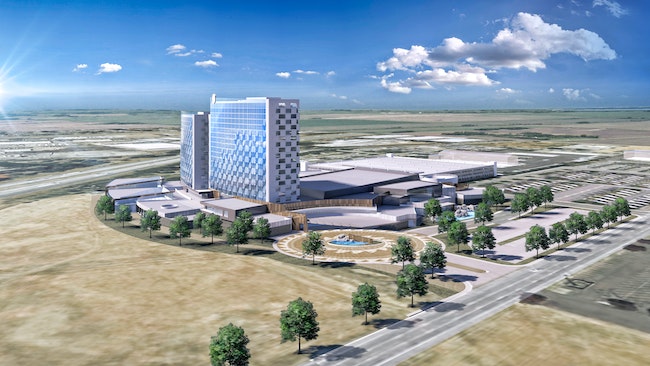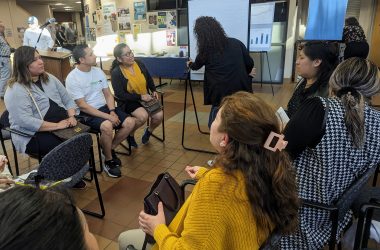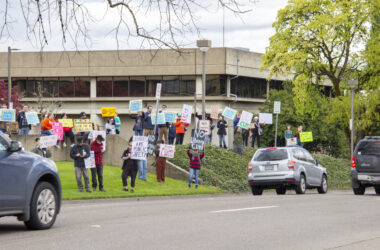 A rendering of the proposed Siletz casino in Salem near I-5.
A rendering of the proposed Siletz casino in Salem near I-5.
Officials with the city of Salem and Confederated Tribes of Grand Ronde want more time to review plans for a proposed tribal casino in north Salem as the Siletz tribe seeks federal approval for the project.
The Confederated Tribes of Siletz Indians plans to establish a 20-acre off-reservation casino at 4751 Astoria Street N.E. in Salem, off Interstate 5.
The proposed 180,800-square-foot casino would house 2,000 gaming devices and 45 tables. There would also be a 500-room hotel, nightclub and sports bar.
The project still requires approval from the Secretary of the Interior and Gov. Kate Brown to move forward.
On Wednesday, Jan. 26, at 6 p.m. the federal Bureau of Indian Affairs is holding a public hearing on the proposed casino.
The agency on Jan. 7 released a more than 2,700-page environmental assessment that gauges the impacts of building such a facility, like noise, traffic and water demand.
The assessment said the casino would consume about 125 million gallons of water annually and lead to more than 7,800 vehicles daily entering or exiting the site.
The public comment period on that assessment ends on April 8.
The city of Salem has asked the Bureau of Indian Affairs for more time to review the assessment. The Confederated Tribes of Grand Ronde are asking the Bureau of Indian Affairs to move to a more comprehensive environmental impact statement to allow more time to consider the project.
Grand Ronde is opposed to the project, saying that the loss of business at the tribe’s Spirit Mountain Casino from a competing casino would “cause a budget deficit drastically affecting Grand Ronde’s ability to provide critical programs, invest in infrastructure and maintain and preserve the unique culture of Grand Ronde,” according to a news release.
Spirit Mountain Casino is located on the Grand Ronde reservation, about 40 minutes west of Salem.
The Siletz tribe expects to generate $185 million in its first year of operation and $231 million by its third. It also said the casino would generate 1,204 full time jobs.
If built, the casino would have a unique revenue-sharing arrangement. Half of profits generated would go to other tribes, with another quarter going to state and local governments, according to a fact sheet released by the tribe.
Craig Dorsay, tribal attorney for Siletz, said calls for an environmental impact statement are designed to delay the project further.
He said the Bureau of Indian Affairs first suggested a less-stringent environmental assessment because of the zoning and nature of the land in question.
“We don’t think one is required but if we had to do one, we’re glad to do it,” he said.
Dorsay said the tribe planned for an environmental impact statement, asking the firm that completed the environmental assessment to “do the quality of work in their studies that would satisfy the standard for an (environmental impact statement). In case we had to go that route we’d already hopefully satisfy that standard rather than start over.”
On Jan. 18, Dan Atchison, city attorney, sent a letter to the assistant secretary- Indian affairs requesting a 120-day extension to review the assessment, until June 7.
“An extension of the comment period is necessary to allow for an adequate review of the (environmental assessment) and to provide meaningful comments on this project,” he wrote.
Courtney Knox-Busch, spokesperson for the city, said city staff are preparing to submit comments regarding potential impacts on infrastructure and services, like transportation, police and fire.
Jose Gonzalez, Salem city councilor, said he’s opposed to the project which would go in the ward he represents.
“The attraction of revenue I understand, but it’s not worth the negative impact in northeast Salem,” he said.
Some of the negatives he sees are increased traffic and customers being taken away from small Latino-owned businesses.
He said he lives about five minutes from the proposed casino and “I don’t want my kids seeing that every day as we drive in our neighborhood. It’s not the image I want my kids to see every day.”
In an interview with Salem Reporter in 2020, Justin Martin, lobbyist for the Grand Ronde, said if the Siletz casino were to be approved it would undermine the original aims behind tribal gaming, which was to create economic opportunity around reservations.
Dorsay, the Siletz attorney, said the casino is seeking an exception through the Indian Gaming Regulatory Act, which prohibits gaming on lands acquired in trust after 1988.
The proposed casino is on land held in federal trust for the Siletz since 2000.
He said the exception has only been approved a handful of times around the country and it’s “not the opening of a pipeline to off-reservation casinos.”
Dorsay said the Siletz have had an office in Salem since 1974 and there are about 900 members that live in the Salem area.
“So, the casino is going to have a huge impact on Siletz members and also on the community,” he said.
Following the public comment period, the Bureau of Indian Affairs will determine if the environmental assessment is sufficient, needs more work or if there should be a more detailed environmental impact statement.
If the assessment is considered sufficient, Interior Secretary Deb Haaland will make a “two-part determination” on the project to ensure it would be in the best interest of the tribe and not detrimental to the surrounding community.
If approved by Haaland, Gov. Kate Brown has a year to approve or reject the casino.
Brown has not publicly stated a position on the project, saying she’s waiting for a federal decision before weighing in.
Contact reporter Saphara Harrell at 503-549-6250, [email protected].
JUST THE FACTS, FOR SALEM – We report on your community with care and depth, fairness and accuracy. Get local news that matters to you. Subscribe to Salem Reporter starting at $5 a month. Click I want to subscribe!









